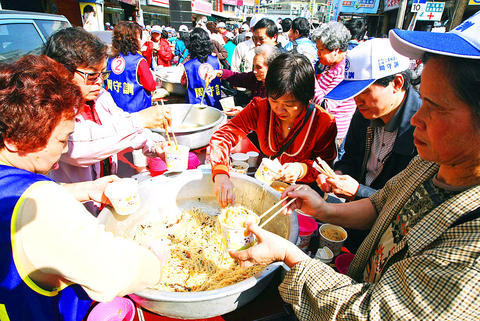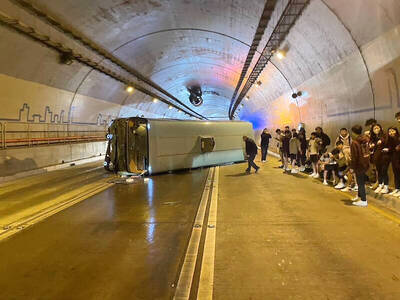Getting voters out of the house and to the polling stations for Saturday's legislative elections may be one of the biggest challenges for the two dominant political parties, analysts said yesterday.
Under the new single-member district and two-vote system (
"Some constituencies have only two candidates competing for one slot. The game is pretty much set in some districts because of the electoral structure," he said.

PHOTO: CNA
The presidential election in March could also contribute to a low turnout rate, Wu said, as some voters pay more attention to the presidential poll than legislative elections because they believe the presidential poll is more important.
The Chinese Nationalist Party's (KMT) campaign strategy is clear, Wu said. They are trying to link the legislative elections to the presidential poll and define Saturday's electoral results as a "thermometer" for the March election.
The Democratic Progressive Party (DPP) is divided over the impact of the legislative polls on the presidential election, with some arguing that a poor showing at Saturday's elections would help the party win the presidential election because of sympathy votes.
Others, however, contend that an election defeat in the legislative elections would have a domino effect on the presidential poll.
The final week before the elections is key, Wu said, adding that he expected to see the KMT and the DPP engage in "regional mobilization" efforts.
In other words, he said, the two parties may resort to the traditional scheme of vote-buying.
While the new electoral system is supposed to be an improvement on the old system, Wu said that it actually exacerbates some problems, including vote-buying.
Chao Yung-mau (
Chao said he thought the two bigger parties would have a hard time getting voters to turn out and cast ballots, mainly because of public ambivalence.
While the new electoral system will promote two-party politics, Chao said voters do not seem to trust the two biggest parties because of their performances have been "unimpressive."
On the one hand, voters are unhappy with the lackluster performance of the DPP administration, but on the other hand, they do not think the KMT has done a good job as an opposition party, he said.
"Voters, who are disappointed at the infighting between the two parties would rather stay home," he said.
The support base of the two parties, however, will still come out and vote, Chao said, adding that the DPP and KMT are expected to make all-out efforts to court undecided voters in the final week of the elections, possibly through bribes.
But Chan Chang-chuan (
"How do you expect voters to be enthusiastic about the elections when what they see on TV or in the newspapers about the elections is all personal attacks or political maneuvering," he said.
Voters may seem indifferent about the elections, but Chan said he did not think the turnout rate would be an issue because the two camps would do whatever it took to mobilize its supporters to come out and vote.
The anxiety the two camps are creating now is just part of their campaign strategy, he said.
But the new system is bad news for small parties, he said.
In addition to competing with the two biggest parties for district legislator seats, smaller parties must garner at least 5 percent of the second-ballot vote to be eligible for legislator-at-large seats.
Wu said that, according to his calculations, each party must secure between 700,000 and 800,000 votes to qualify for legislator-at-large seats, adding that this would be an extremely difficult target for smaller parties to meet.
He speculated that the Taiwan Solidarity Union or the New Party would stand a better chance than other small parties, but he had reservations about how effective the two parties were at presenting platforms that will win the favor of voters.
After all, the new electoral system has been designed by the two biggest parties to work to their advantage -- at the expense of smaller parties that will find it increasingly tough to survive, Wu said.
"Voters are not stupid," Wu said. "They will only vote if they believe the value of their ballot will have a positive effect, which is to say their party will win. Otherwise, they simply don't vote."

The Central Weather Administration (CWA) today issued a "tsunami watch" alert after a magnitude 8.7 earthquake struck off the Kamchatka Peninsula in northeastern Russia earlier in the morning. The quake struck off the east coast of the Kamchatka Peninsula at 7:25am (Taiwan time) at a depth of about 19km, the CWA said, citing figures from the Pacific Tsunami Warning Center. The CWA's Seismological Center said preliminary assessments indicate that a tsunami could reach Taiwan's coastal areas by 1:18pm today. The CWA urged residents along the coast to stay alert and take necessary precautions as waves as high as 1m could hit the southeastern

The National Museum of Taiwan Literature is next month to hold an exhibition in Osaka, Japan, showcasing the rich and unique history of Taiwanese folklore and literature. The exhibition, which is to run from Aug. 10 to Aug. 20 at the city’s Central Public Hall, is part of the “We Taiwan” at Expo 2025 series, highlighting Taiwan’s cultural ties with the international community, National Museum of Taiwan Literature director Chen Ying-fang (陳瑩芳) said. Folklore and literature, among Taiwan’s richest cultural heritages, naturally deserve a central place in the global dialogue, Chen said. Taiwan’s folklore would be immediately apparent at the entrance of the

“China is preparing to invade Taiwan,” Deputy Minister of Foreign Affairs Francois Wu (吳志中) said in an exclusive interview with British media channel Sky News for a special report titled, “Is Taiwan ready for a Chinese invasion?” the Ministry of Foreign Affairs said today in a statement. The 25-minute-long special report by Helen Ann-Smith released yesterday saw Sky News travel to Penghu, Taoyuan and Taipei to discuss the possibility of a Chinese invasion and how Taiwan is preparing for an attack. The film observed emergency response drills, interviewed baseball fans at the Taipei Dome on their views of US President

Speeding and badly maintained roads were the main causes of a school bus accident on a rainy day in Taipei last year that severely injured two people and left 22 with minor injuries, the Taiwan Transportation and Safety Board said. On March 11 last year, a Kang Chiao International School bus overturned inside the Wenshan Tunnel (文山隧道) on the northbound lane of the Xinyi Expressway. The tour bus, owned by Long Lai Co, exceeded the speed limit after entering the tunnel, the board’s investigation found. Sensing that the rear of the vehicle was swaying, the driver attempted to use the service and exhaust